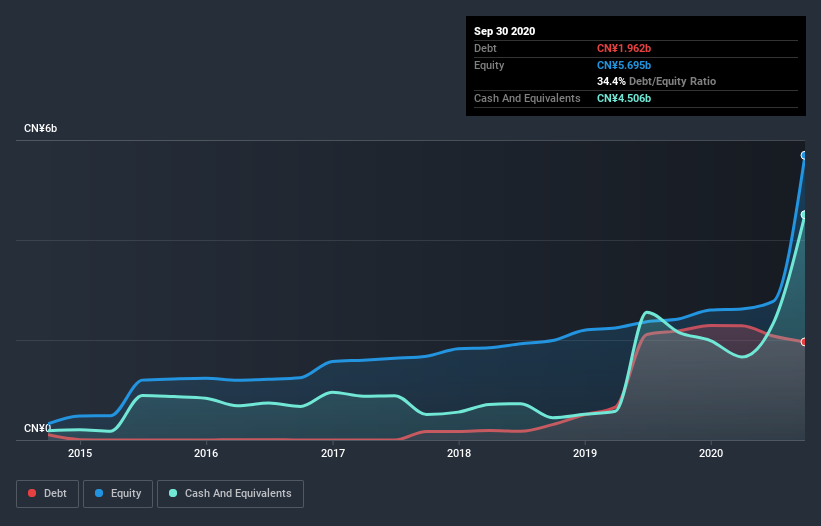Is Baozun (NASDAQ:BZUN) A Risky Investment?
Some say volatility, rather than debt, is the best way to think about risk as an investor, but Warren Buffett famously said that 'Volatility is far from synonymous with risk.' So it might be obvious that you need to consider debt, when you think about how risky any given stock is, because too much debt can sink a company. Importantly, Baozun Inc. (NASDAQ:BZUN) does carry debt. But the real question is whether this debt is making the company risky.
What Risk Does Debt Bring?
Debt assists a business until the business has trouble paying it off, either with new capital or with free cash flow. Ultimately, if the company can't fulfill its legal obligations to repay debt, shareholders could walk away with nothing. However, a more usual (but still expensive) situation is where a company must dilute shareholders at a cheap share price simply to get debt under control. Of course, the upside of debt is that it often represents cheap capital, especially when it replaces dilution in a company with the ability to reinvest at high rates of return. When we think about a company's use of debt, we first look at cash and debt together.
See our latest analysis for Baozun
How Much Debt Does Baozun Carry?
You can click the graphic below for the historical numbers, but it shows that Baozun had CN¥1.96b of debt in September 2020, down from CN¥2.18b, one year before. But on the other hand it also has CN¥4.51b in cash, leading to a CN¥2.54b net cash position.
A Look At Baozun's Liabilities
The latest balance sheet data shows that Baozun had liabilities of CN¥1.89b due within a year, and liabilities of CN¥2.16b falling due after that. Offsetting these obligations, it had cash of CN¥4.51b as well as receivables valued at CN¥1.64b due within 12 months. So it actually has CN¥2.10b more liquid assets than total liabilities.
This surplus suggests that Baozun has a conservative balance sheet, and could probably eliminate its debt without much difficulty. Simply put, the fact that Baozun has more cash than debt is arguably a good indication that it can manage its debt safely.
And we also note warmly that Baozun grew its EBIT by 18% last year, making its debt load easier to handle. When analysing debt levels, the balance sheet is the obvious place to start. But it is future earnings, more than anything, that will determine Baozun's ability to maintain a healthy balance sheet going forward. So if you're focused on the future you can check out this free report showing analyst profit forecasts.
Finally, while the tax-man may adore accounting profits, lenders only accept cold hard cash. While Baozun has net cash on its balance sheet, it's still worth taking a look at its ability to convert earnings before interest and tax (EBIT) to free cash flow, to help us understand how quickly it is building (or eroding) that cash balance. Over the last three years, Baozun recorded negative free cash flow, in total. Debt is usually more expensive, and almost always more risky in the hands of a company with negative free cash flow. Shareholders ought to hope for an improvement.
Summing up
While it is always sensible to investigate a company's debt, in this case Baozun has CN¥2.54b in net cash and a decent-looking balance sheet. And it impressed us with its EBIT growth of 18% over the last year. So we don't have any problem with Baozun's use of debt. There's no doubt that we learn most about debt from the balance sheet. However, not all investment risk resides within the balance sheet - far from it. We've identified 2 warning signs with Baozun , and understanding them should be part of your investment process.
Of course, if you're the type of investor who prefers buying stocks without the burden of debt, then don't hesitate to discover our exclusive list of net cash growth stocks, today.
This article by Simply Wall St is general in nature. It does not constitute a recommendation to buy or sell any stock, and does not take account of your objectives, or your financial situation. We aim to bring you long-term focused analysis driven by fundamental data. Note that our analysis may not factor in the latest price-sensitive company announcements or qualitative material. Simply Wall St has no position in any stocks mentioned.
Have feedback on this article? Concerned about the content? Get in touch with us directly. Alternatively, email editorial-team (at) simplywallst.com.

 Yahoo Finance
Yahoo Finance 
